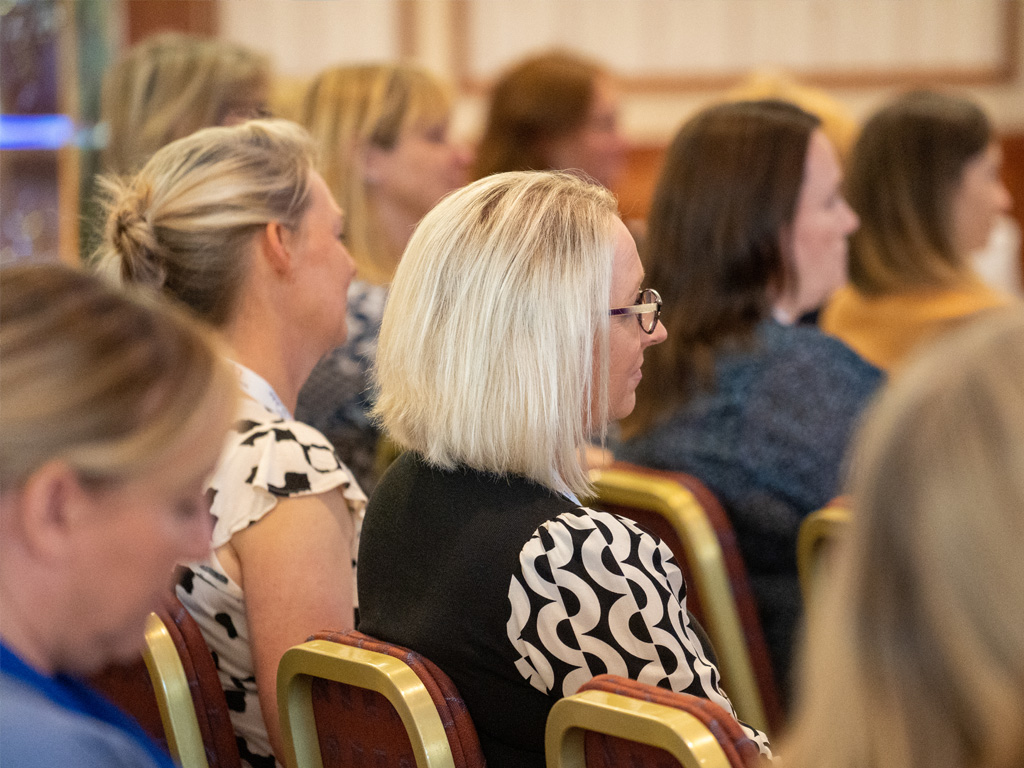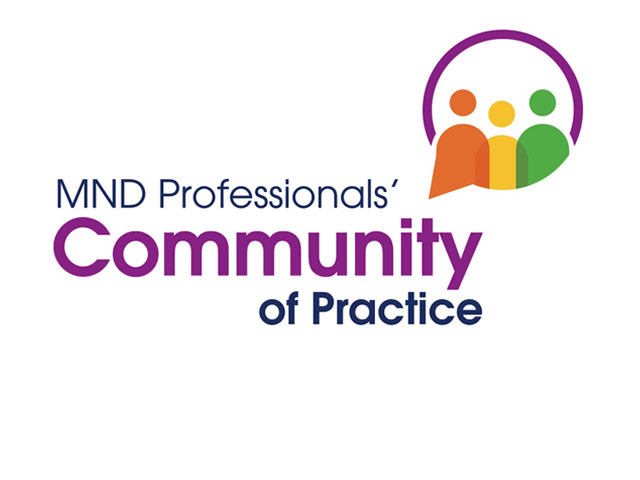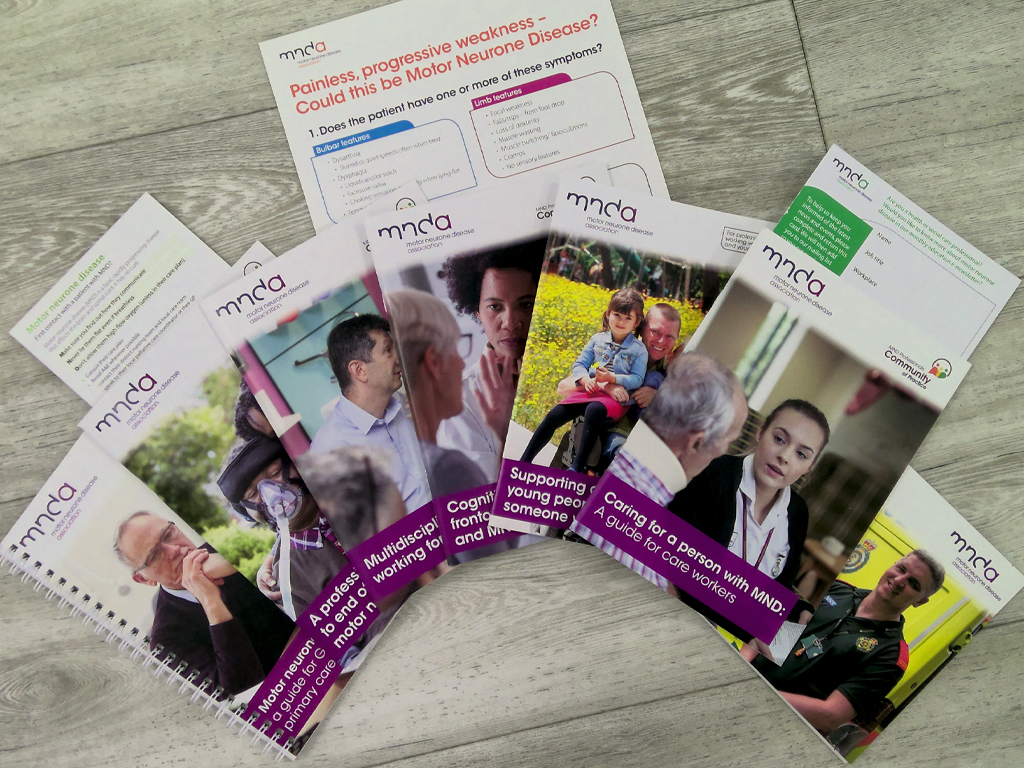
Here is a comprehensive list of the education events and opportunities that will support your continuous professional development - from webinars to conferences.
Click on a drop down to get more information about a particular event and as well as how to book or take part.
Please contact us at [email protected] if you have any queries about our education offering for health and social care professionals.
Supporting choice and control for people living with and affected by MND - 7 October 2025
This year, we will examine how to support people with MND in having choice and control over their own care. This includes helping them make informed decisions about treatments, understand their rights, and regularly review their understanding.
“Everyone deserves an opportunity to make choices” – attendee at last year’s event
Aim: The aim is to gain valuable skills to apply to your practice by learning from and with your peers and actively exploring topical issues in MND care. There will be talks, discussions of case studies, hands-on demonstrations, exhibitors and networking.
Date: Tuesday 7 October
Time: 9.00am – 4.30pm
Cost: £35 EARLYBIRD rate until 31 August, £50 thereafter
Venue: National Conference Centre, Coventry Road, Bickenhill, Solihull, B92 0EJ
The day will start with an inspiring keynote speech delivered by Dr Brian Dickie, MBE Chief Scientist at the MND Association. It will be followed by a short self-care session to ground and reflect, led by Dr Emily Mayberry, Senior Clinical Psychologist and Dr Rachel Woolrich, Clinical Psychologist.
Afterwards, you’ll choose from a wide variety of stimulating sessions led by subject experts to build your competency in key areas for people living with MND. Sessions include:
- I know what would be good to know!
- New pathways for eating and drinking (with acknowledged risk) and management of secretions
- Crisis is a legitimate decision
- I didn’t sign up for this! Caring for carers
- Assisted dying – ethical, emotional and professional challenges
- Genetic toolkit: developing patient decision aids around genetic testing for people living with MND
- Let your yes be yes….supporting choices when mental capacity is impaired
- Competent and in control of your CPD!
Webinars
A Botulinum Toxin clinic for MND patients: A case study – 29 April 2025
Time: 11.00am – 12.30pm
Aim: To demonstrate the use of Botulinum Toxin in MND for the management of excessive saliva and bruxism.
By the end of the session, you will have:
- a better understanding of the uses to which Botulinum Toxin can be put in MND
- a better understanding of when Botulinum Toxin might be considered as a solution i.e. what might have been tried before
- an understanding of how Botulinum Toxin is administered
- considered the pros and cons of using Botulinum Toxin with the MND patient population.
Speaker: Professor Tim Harrower, MND Peninsula Care and Research Network
Orthotics: supporting people living with MND – 10 June 2025
Time: 11.00am – 12.30pm
Aim: To explore the effective use of orthotics for people living with MND.
Objectives:
- to introduce allied health professionals to different types of orthotics from head supports through to splinting
- to increase knowledge of the symptoms that might be treated using orthotics
- to understand the results that might be achieved through the use of orthotics
- to increase awareness of where to find advice about, and access to, orthotics.
By the end of the session, you will have:
- the ability to recall the range of orthotics appropriate for use with people living with MND
- an awareness of the symptoms of MND that can be lessened or alleviated with the use of orthotics
- knowledge on how to refer to orthotics and get support from this therapy area
- been introduced to the most current advances in orthotic design.
Speaker: Lauryn Campbell, Opcare and Archie Veale, Carlisle Cumbria NHS Clinic
Complementary therapies: what are they and how might they be used with someone living with MND? - 26 August 2025
Pre-recorded webinar – release date 26 August 2025
Aim: To explore the range of complementary therapies which might be of use to people living with MND.
Objectives:
- to give an overview of what complementary therapies are
- to examine the use of complementary therapies for people living with and affected by MND
- to provide examples of how complementary therapies have been integrated with medical care
- to consider any research into the efficacy of complementary therapies in this patient group.
By the end of the session, you will:
- have an understanding of what is meant by complementary therapies
- be able to recall a variety of complementary therapies and how they might be employed in MND
- have been introduced to a setting in which complementary therapies have been successfully used
- have heard from a person living with MND about their experience with complementary therapies.
Speaker: Dr Lisa Bushby, Senior Occupational Therapist at St Oswald's Hospice, Honorary Research Fellow at Newcastle University and Honorary Contract for Specialist Occupational Therapy and clinical Hypnosis at the Newcastle Motor Neurone Disease Care and Research Centre
View speaker biography
Register to receive this webinar on its release
MND respiratory care in the community – 3 November 2025
Time: 11.00am – 12.30pm
Aim: To explore home based respiratory support for MND patients.
By the end of the session, you will have:
- an understanding of the operation of a home NIV service
- an understanding of the MDT members involved in supporting respiratory care at home
- an introduction into the basics of home NIV
- the ability to identify the common issues with cough augmentation for MND patients with bulbar weakness
- an understanding of the suggested strategies to optimise cough augmentation for MND patients with bulbar weakness.
Speakers:
- Kathryn Crawford, Respiratory Specialist Physiotherapist, Belfast Health and Social Care Trust
- Charlotte Massey, Specialist Neuromuscular and Respiratory Physiotherapist, NIHR Doctoral Fellow, Sheffield Institute for Translational Neuroscience
Speaker biographies:
Conversations with...
"Conversations with..." are brief, 30-minute events that explore topical issues in MND care, driven by the needs and interests expressed by the professional community. They are always online and feature an informal conversation between a host and a subject specialist, responding to questions submitted by the MND community either before or during the event.
The aims are to provide professionals with opportunities to:
- share their interest in areas of MND care
- have their questions answered by subject experts
- highlight specific needs within the MND community.
Questions for each event can be sent to [email protected].
Booking is not required - simply drop in using the Zoom link provided in the event description.
All "Conversation with..." will be recorded and uploaded to our webinars page for future viewing.
Conversation with...an Art Therapist - 9 June 2025
Time: 11am - 11.30am
Location: Online
We are delighted to be joined by Adam Levene, Art therapist based in East Sussex, and Rachel Thomson, Coordinator at the Sussex MND Care and Research Centre to answer your questions on art therapy and the project Adam is doing with people with MND and their families in Sussex. You can read more about the Sussex MND art therapy project on pages 20-21 of our previous Thumbprint issue here.
If you have a question for Adam and Rachel, email them to [email protected].
No need to book – save the date in your diary and just drop in using the link below!
Join Zoom Meeting: https://us06web.zoom.us/j/81352655598?pwd=bbjXhtSBPd4qaix3ugyAxafjFXT4R0.1
Meeting ID: 813 5265 5598
Passcode: CC06A
Workshops
A workshop is a brief, intensive educational program focussing on techniques and skills delivered to a relatively small group of people. Workshops are usually delivered face to face, but with careful planning could be online. The features of a workshop are that they:
- pass on knowledge and instruction around a specific skill set
- provide significant real time opportunities for participants to practice the skills being taught
- wherever possible will have some form of formal accreditation for the skills being passed on.
We use our MND Association workshops support when a key skill deficit has been identified and it is appropriate for the Association to make a response. The aim, as with all of our education provision, is to supplement existing health and social care training with MND-specific content to enhance professionals’ understanding of the disease and how to provide the best possible support. In a workshop this enhancement is very practical with clear links to practice.
Dietetics workshop - The nutritional management of people living with MND (Various dates and locations)
Dates and Locations:
- 4 June 2025 – Ashton Gate Stadium, Ashton Road, Bristol, BS3 2EJ
- 8 July 2025 – The Barn Hotel & Spa, Toll Bar Road, Marston, Grantham, NG32 2HT
- 17 November – National Council for Voluntary Organisations (NCVO), Society Building, 8 All Saints Street, London, N1 9RL
Time: 09:45-16:00
Cost: £50.00 View Events Cancellation Policy
These workshops will be delivered by subject experts and have been endorsed by BAPEN, NNNG, PINNT, BDA, PENG, RCSLT and also have CPD accreditation.
Aim: To introduce members of the MDT to the effective nutrition management of people living with MND.
By the end of the one-day session, participants will understand:
- the impact of nutritional status on the outcomes of people living with MND
- how to identify and monitor the nutritional status of people living with MND, including malnutrition screening
- the nutrition support interventions available to prevent or resolve malnutrition including oral and enteral nutrition options
- the dysphagia management of people living with MND
- how to support people living with MND to make informed decisions about the option to have a gastrostomy
- the management of people living with MND on enteral nutrition
- how to apply the above in real-world practice.
Speaker biographies: Coming soon
Email [email protected] to register your interest in the workshop in Bristol
MND Respiratory problems in MND: a multidisciplinary team approach (Various dates and locations)
Dates and Locations:
- 20 March 2025 - The Barn Hotel & Spa, Toll Bar Road, Marston, Grantham, NG32 2HT
- 1 July 2025 – Ashton Gate Stadium, Ashton Road, Bristol, BS3 2EJ
- 12 November – National Council for Voluntary Organisations (NCVO), Society Building, 8 All Saints Street, London, N1 9RL
Time: 09:00-16:00
Cost: £50.00 View Events Cancellation Policy
These one- day face-to-face workshops are aimed at all members of the MDT who would like to learn more or are interested in respiratory assessment and management. They will be delivered by subject experts and have been endorsed by SiLVaH and also have CPD accreditation
Aim: To introduce nurses and allied health professionals to respiratory assessment and management for people living with MND.
By the end of the one-day session, participants will:
- have been introduced to respiratory failure, and its progression, in the context of MND
- be better able to recognise the indications of possible respiratory failure from other symptoms
- be able to describe the respiratory assessments, including sleep studies, which may be performed on people living with MND with suspected respiratory failure
- have been introduced to evidence which supports the use of non-invasive ventilation (NIV) with MND patients
- understand the equipment and different modes and settings used in NIV
- be able to explain secretion clearance and cough assistance techniques in order to support the people with MND in their care and prepare them for the procedures
- have been introduced to some of the pharmacological options for secretion management
- have had an opportunity to explore case studies and through knowledge application and discussion identify the presenting problem and the appropriate action to take.
Speaker biographies: Coming soon
Cognitive deficits and behavioural symptoms in MND: beyond the motor cortex
Date and location:
- 9 September 2025 - National Council for Voluntary Organisations (NCVO), Society Building, 8 All Saints Street, London, N1 9RL
Time: 09:30-16:00
Cost: £50.00 View Events Cancellation Policy
Aims:
To introduce members of the MDT on behavioural symptoms and cognitive deficits in MND.
By the end of the one-day session, participants will:
- have gained an understanding of the impact of cognitive and behavioural symptoms on the patient
- have gained an understanding of the impact cognitive and behavioural symptoms on the family: change in relationships
- have been introduced to research in this area
- have learned the international ALSFTD diagnostic criteria
- have considered the main behavioural symptoms in MND
- be able to describe the differences between behavioural symptoms and mental health issues in MND
- have explored clinical assessments to use in practice
- understand how to make interpretations of the assessments, in combination with clinical reasoning, and the above learning points
Speaker: Eneida Mioshi, University of East Anglia
Speaker's biography: coming soon
Competency sessions
A Competency Session provides tuition by an expert, or experts, delivered to an audience of health and social care professionals with a desire to build proficiency, knowledge and ability in a defined area of practice, to then implement and develop skills.
They may be delivered face to face or online depending on the subject matter. Wherever possible, they are accredited by the CPD Accreditation Service and a relevant professional organisation.
The features of a competency builder are that they:
- have a running time up to a full day, dependent upon the subject matter
- are taught by an expert that has achieved mastery of the competency
- may have a clearly defined practical element to them
- provide an opportunity for participants to interact with and learn from each other
- include the provision of a reference list of further reading and resources to support ongoing learning.
We use our MND Association Competency Sessions to respond to significant expressed or identified needs. The aim, as with all our education provision, is to supplement existing health and social care training with MND-specific content to enhance professionals’ understanding of the disease and how to provide the best possible support. In a Competency Session, this enhancement is at an advanced level.
Effective management of communication difficulties in MND - 13 May 2025
Time: 09.30 am – 3.45 pm
Cost: £50 View Events Cancellation Policy
This session is aimed at SLTs and other MDT members wanting greater depth about communication difficulties and possible strategies. It will be endorsed by the RCP and the CPD Accreditation Service.
Aim: To explore, in depth, the management of communication difficulties in MND.
By the end of the session, you will have:
- had a brief recap of the various communication difficulties in MND
- increased knowledge about the range of voice banking options and how to use them
- considered the effective use of message banking, video banking and legacy tools
- improved confidence to develop management strategies across the patient’s MND journey
- considered the impact of cognitive change on communication in MND and how management may change when FTD is diagnosed
- explored and discussed the principles of good practice in AAC and its place in effective communication
- considered the integration of environmental controls with AAC
- had an opportunity to bring case studies to the session for reflective practice.
Information and Knowledge Exchanges
Information and Knowledge Exchange events are exclusively for members of the MND Professionals' Community of Practice, a peer led group of health and social care professionals encouraging and supporting the development of good care for people living with, or affected by, MND.
Crisis management: when lack of proactivity leads to emergency - 25 March 2025
Time: 11.00am - 1.30pm
Location: Online via Zoom
MND sometimes presents crisis to those affected - including to the families of people with MND and professionals. Each crisis is a unique mixture of biological, psychological and social elements, from a sudden change in symptoms or in carers, to a restriction on services which delays responses to equipment and adaptation needs. During this event, clinicians will share their experiences supporting people with MND facing a crisis, offering valuable insights for other MDT professionals.
The session will consist of two presentations and discussion groups.
Session one - The voice for a person with MND who did not want a gastrostomy
The NICE guideline for MND states that professionals should be aware that some individuals may not want a gastrostomy. This was the case for a person with bulbar onset MND, whose decision led to a crisis as those closest to them struggled to accept it. Caroline Mathias, Highly Specialist Occupational Therapist in Neurological Rehabilitation at the Royal Hampshire County Hospital, will talk about how she acted as a voice for the person with MND and facilitated family meetings to enable open and honest communication, easing fears while respecting the wishes of the person with MND.
Session two- Juggling balls to manage a crisis...without dropping any
The NICE guideline for MND states that equipment and adaptations should be provided without delay to maintain quality of life and allow the person with MND to continue participating in daily activities. In practice, social care professionals juggle the challenges of addressing the varying progression of the condition for each individual, their changing needs and the frameworks under which adaptations are provided. Kristina Wintringham and Charissa Chatterton, Occupational Therapists with Durham County Council, will reflect on working with households affected by MND and drawing out factors which support best practice in this area.
Speaker biographies: Coming soon
Withdrawal of treatment - 24 June 2025
Time: 11.00am - 1.30pm
Location: Online via Zoom
Some people with MND may choose to refuse or withdraw treatments such as gastrostomy or respiratory support. Based on your requests for more information on how MDTs can make these processes as comfortable as possible for all these involved, this event will explore these scenarios from the perspectives of both clinicians and families of people with MND.
Session one - Withdrawal of home mechanical ventilation
Alison Armstrong, Nurse Consultant with the North East Assisted Ventilation Service in Newcastle, will talk us through her experiences and reflections on these scenarios.
Session two - Refusing gastrostomy feeding
Tracy Sanderson, Association Visitor and Chair of the West Yorkshire Branch of the MND Association, will share her experience of her husband David deciding to refuse gastrostomy feeding.
Session three - Time to decide?
This session will be led by Dr Idris Baker, Consultant in Palliative Medicine and co-director of the MND Care Network in South Wales.
Speaker biographies: Coming soon
Cognitive change - 23 September 2025
Time: 11.00am - 1.30pm
Location: Online via Zoom
Many people living with MND experience changes in cognition and behaviour. Based on your requests, this event will explore practical and effective strategies to manage these symptoms.
Presentations titles and speakers to be announced shortly
Speaker biographies: Coming soon


